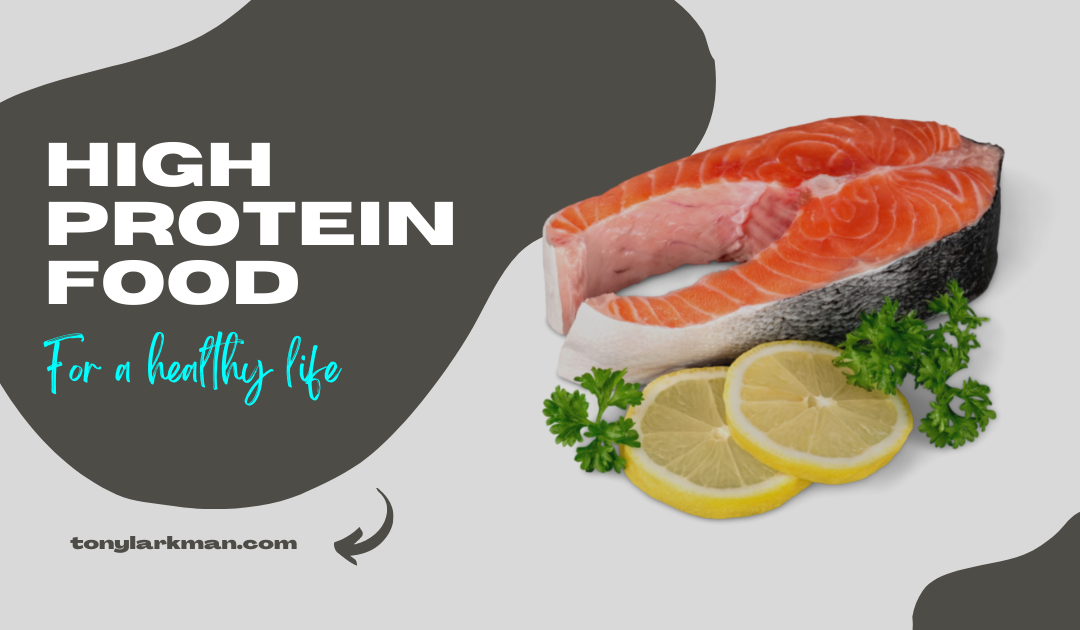Your body needs protein foods.
There are 20 different kinds of amino acids to function correctly. These 20 amino acids combine in different ways to make proteins in your body.
And your body cannot make nine of the amino acids you need. You must get them from the food you eat. So foods high in protein that contain these nine amino acids are essential amino acids.
- Histidine: Histidine helps make a brain chemical (neurotransmitter) called histamine. Histamine plays an important role in your body’s immune function, digestion, sleep and sexual function.
- Isoleucine: Isoleucine is involved with your body’s muscle metabolism and immune function. It also helps your body make hemoglobin and regulate energy.
- Leucine: Leucine helps your body make protein and growth hormones. It also helps grow and repair muscle tissue, heal wounds and regulate blood sugar levels.
- Lysine: Lysine is involved in the production of hormones and energy. It’s also important for calcium and immune function.
- Methionine: Methionine helps with your body’s tissue growth, metabolism and detoxification. Methionine also helps with the absorption of essential minerals, including zinc and selenium.
- Phenylalanine: Phenylalanine is needed for the production of your brain’s chemical messengers, including dopamine, epinephrine and norepinephrine. It’s also important for the production of other amino acids.
- Threonine: Threonine plays an important role in collagen and elastin. These proteins provide structure to your skin and connective tissue. They also help with forming blood clots, which help prevent bleeding. Threonine plays an important role in fat metabolism and your immune function, too.
- Tryptophan: Tryptophan helps maintain your body’s correct nitrogen balance. It also helps make a brain chemical (neurotransmitter) called serotonin. Serotonin regulates your mood, appetite and sleep.
- Valine: Valine is involved in muscle growth, tissue regeneration and making energy.
Source: Harvard School of Public Health
Below is a list of foods which are generally easy to obtain from local supermarkets, food grocers and farm shops and contain high levels of protein.
FISH AND SEAFOOD
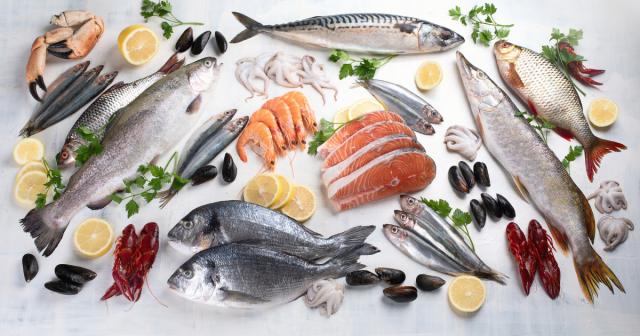
full of protein and light on calories
High in protein and loaded with healthy omega-3 fatty acids, 100g of salmon fillets packs 23g protein, 11g fat (mainly healthy fats) and 0.5g carbohydrates totalling 194 calories. (A salmon fillet is typically 125-150g)
Alternatively, 100g of prawns will give you 14.5g protein, 0.5g fat and 0g of carbohydrates totalling 65 calories.
Or how about a sea bass fillet. 159 calories for 100g of sea bass giving 20g protein, 8.5g fat and 0g carbohydrates. (A sea bass fillet is typically 90-100g)
Other popular seafood include cod fillets. A 100g serving of cod contributes 77 calories, 18g protein, 0.2g fat and 0.5g carbohydrates and 100g of haddock has 21g protein, 1g fat and 0g carbohydrates. (A cod fillet is typically 90-100g)
TURKEY
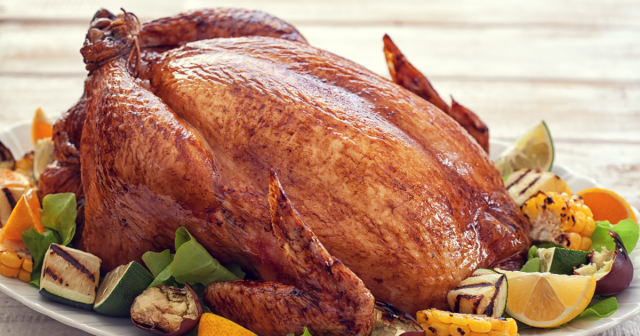
skinless turkey breast is probably the leanest meat protein
Known as a superfood, turkey is fairly comparable to chicken in nutrients but both its dark and white meat are leaner. White meat has slightly less saturated fat than dark. Skinless boneless breast is leanest.
Skinless turkey breast is probably the leanest meat protein. It’s also full of nutrients, particularly niacin, selenium, vitamins B6 and B12, and zinc.
Turkey is also high in tryptophan, the amino acid that makes you sleepy after your meal. The body uses tryptophan to make serotonin. Serotonin is essential for healthy sleep.
100g of turkey breast produces 31.8g protein with only 1.9g fat and 0g carbohydrates totalling 159 calories. (A turkey breast is typically 150-200g)
CHICKEN
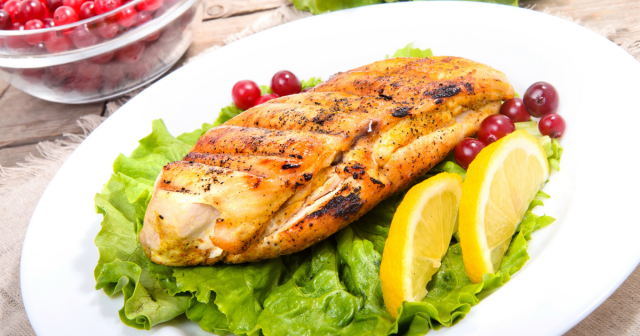
whole chicken contains more calories and less protein than turkey but still a great source of protein
Overall, turkey contains fewer calories and moderately more protein than chicken, except for the chicken breast, which has slightly more protein. Turkey also has less cholesterol, less sodium and more iron.
100g of chicken breast produces 31g protein, 3.5g fat and 0g carbohydrates with 165 calories. (A chicken breast is typically 150-200g)
LEAN BEEF
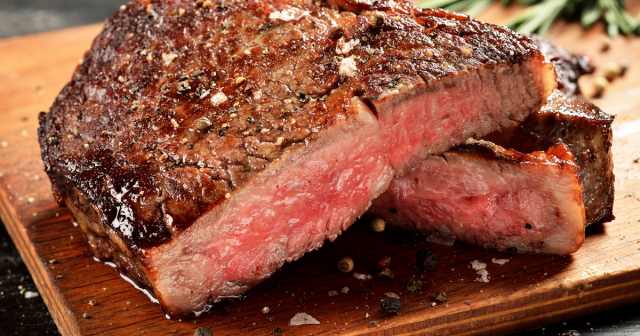
including lean beef in your diet provides your body with high-quality protein
Lean beef is a high source of protein. 100g of rump steak gives you 22g of protein, 4g fat and trace carbohydrates totalling 125 calories. (A rump steak is typically 200g)
A grilled 100g sirloin steak is 165 calories with again no carbs, 5g of fats and a large 31g of protein. (A sirloin steak is typically 200-250g)
100g rib eye steak also gives you 165 calories and no carbs but significantly higher fat of 9g and lower protein levels at 21g than the sirloin. (A rib eye steak is typically 250g)
And an expensive 100g of fillet steak will give you 280 calories containing 24g protein, 22g fat and 0g carbohydrates. (A fillet steak is typically 180-190g)
PORK
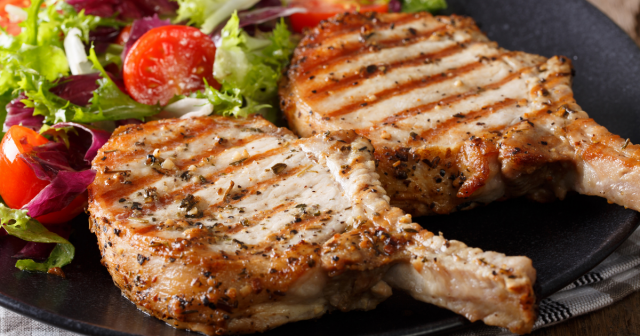
pork is one of the richest sources of leucine
Branched-chain amino acids (BCAAs) are key in supporting muscle recovery. Leucine, in particular, makes up one third of muscle protein and helps to stimulate repair after exercise.
100g of pork chop has 187 calories and trace carbohydrates. A 100g chop contains 9g of fat with 26g of protein. (1 large pork chop is typically 300 calories with 15g fat and 41g protein).
LAMB
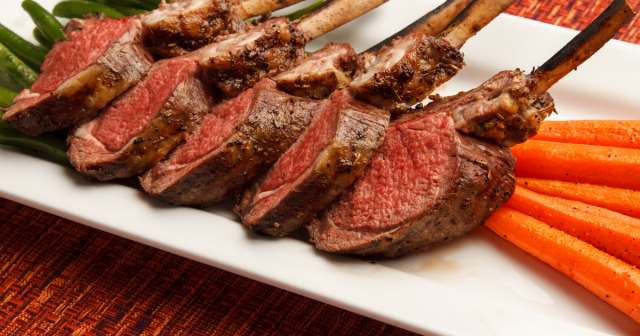
lamb is a great source of protein but also high in saturated fats
When lamb like other red meats is consumed in moderation, it is a healthy addition to a well-balanced diet.
100g of lamb chop has 305 calories and again zero carbohydrates. Lamb is a fatty meat and contains 21g of fat and also an excellent source of protein with 29g. (1 lamb chop is roughly 389 cals with 27g fat and 36g protein).
EGGS
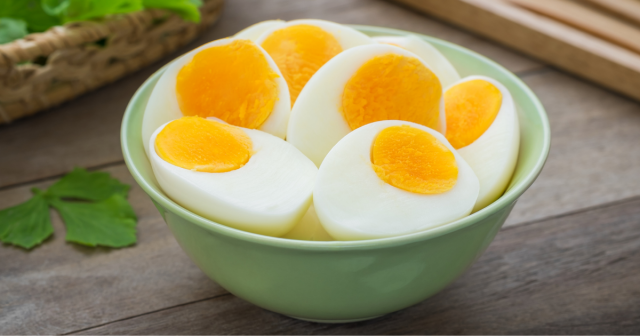
a healthy omelette is a good way to start the day
Eggs contain all nine essential amino acids in sufficient amounts which support effective muscle growth, recovery and maintenance.
Egg whites contain large amounts of proline, one of the amino acids necessary for collagen production.
100g of eggs has 131 calories and trace carbohydrates. They contain 9g fat with 6g unsaturated fats and 12.5g of protein (1 large boiled egg approximately contains 78 cals with 5.5g fat and 7.5g protein).
TOFU
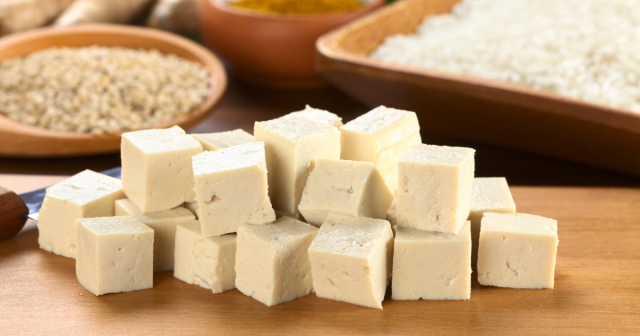
tofu is made by curdling fresh soya milk, pressing it into a solid block and then cooling it
Tofu provides all nine of the essential amino acids we need for growth, repair and functions like immunity. The digestibility of the protein in soya, which refers to how well our body can use the protein, may even be comparable to that of animal protein and is a great source to add to your protein foods list.
100g of tofu has 73 calories and 8g of protein. Tofu contains 4g fat with only 0.5g saturated fats and 0.7g of carbohydrates.
TEMPEH
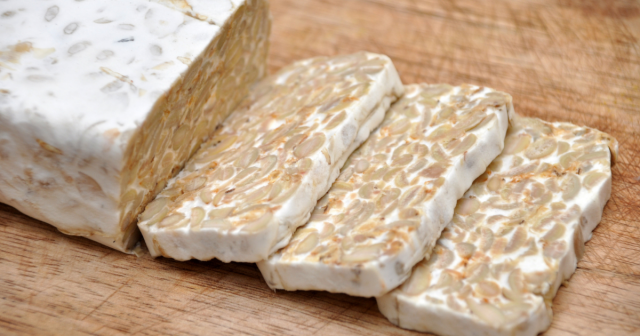
tempeh is a traditional Indonesian food made from soybeans that have been fermented
Following fermentation, the soybeans are pressed into a compact cake commonly consumed as a vegetarian source of protein. Tempeh is also rich in calcium and an excellent addition to protein foods.
100g of tempeh has 166 calories and 20g of protein. Tempeh contains 6.5g fat and 6.5g of carbohydrates.
SEITAN (WHEAT MEAT)
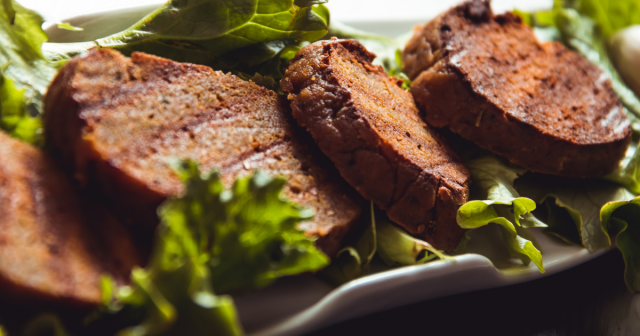
seitan looks the texture of meat when it’s cooked, making it a popular meat substitute
Seitan is the base for many vegetarian protein foods products such as tofurky slices, meatless frankfurters, fakin’ bacon and others. Seitan is made by rinsing away the starch in the wheat dough, leaving just the high-protein gluten behind.
100g of seitan has 126 calories and 25g of protein. Seitan contains 0.6g fat and 5.3g of carbohydrates.
LENTILS
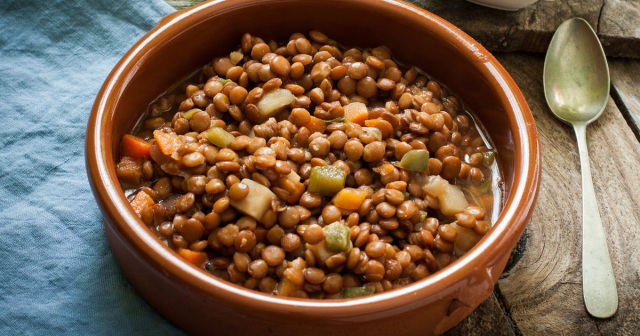
lentils are edible seeds of the legume family and come in a variety of colours including red, green, brown, yellow and black
As much as a third of the calories from lentils comes from protein. Like other legumes, lentils are low in a couple of the amino acids, namely methionine and cysteine. This is easily addressed by combining lentils with cereal grains such as rice or wheat.
100g of lentils has 116 calories and 12g of protein. Lentils contains 0.6g fat and 13g of carbohydrates.
CHICKPEAS
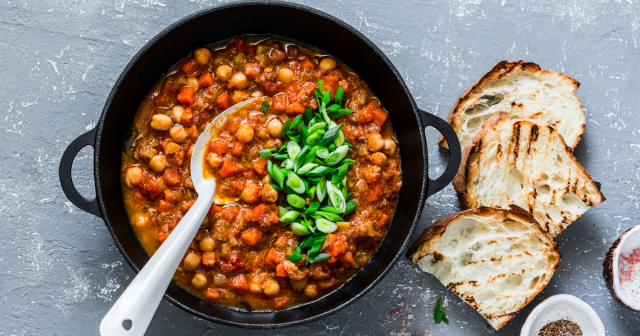
chickpeas are a good source of protein and fibre and are also known as garbanzo beans
Included in a variety of protein foods from hummus to curries, chickpeas are a great way to boost your diet with protein and iron.
100g of chickpeas has 164 calories and 9g of protein. Chickpeas contains 2.5g fat and 9g of carbohydrates.
NUTS
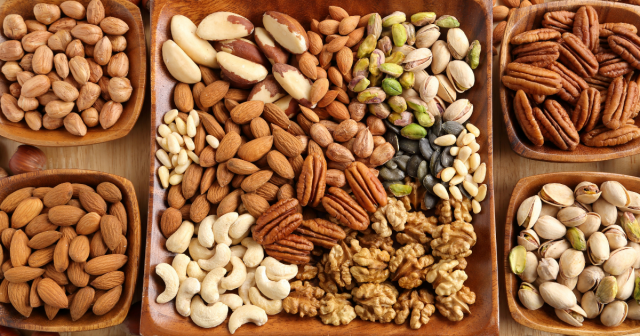
All nuts contain protein however, some provide more than others
As with any snack food, portion control can be a challenge, which is especially true when it comes to calorie-dense nuts. For example, about 20 almonds can contain between 150–200 calories.
100g of almonds (which are actually a seed) has 480 calories and 15.5g of protein. Almonds contain 31g of fat and 15.5g of carbohydrates.
100g of brazil nuts has 692 calories and 14g of protein. Brazil nuts contain 68g of fat and 3g of carbohydrates.
100g of cashew nuts has 582 calories and 18g of protein. Cashews contain 44g of fat and 18g of carbohydrates.
100g of pecans has 721 calories and 9g of protein. Pecan nuts contain 72g of fat and 4.5g of carbohydrates.
100g of hazelnuts has 652 calories and 14g of protein. Hazelnuts contain 64g of fat and 15.5g of carbohydrates.
100g of walnuts has 689 calories and 15g of protein. Walnuts contain 65g of fat and 7g of carbohydrates.
100g of pistachios has 580 calories and 20.5g of protein. Pistachios contain 45g of fat and 17g of carbohydrates.
100g of pine nuts has 693 calories and 14g of protein. Pine nuts contain 69g of fat and 4g of carbohydrates.
100g of peanuts (peanuts are legumes) has 604 calories and 25g of protein. Peanuts contain 53g of fat and 7g of carbohydrates.
NUTRITIONAL YEAST (NOOCH)
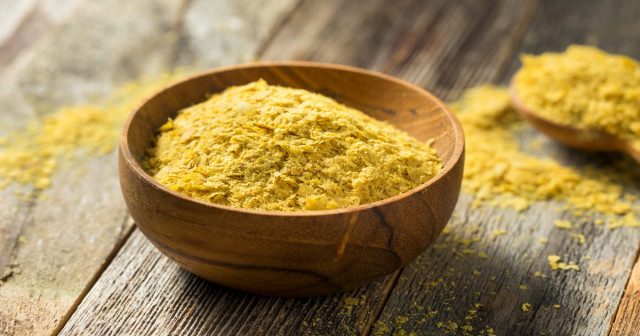
nutritional yeast contains all nine essential amino acids making it a complete protein like those found in animal products
Nutritional Yeast is an inactive, dry form of Saccharomyces cerevisiae, a species of yeast.
Saccharomyces cerevisiae is grown on molasses, cane sugar or some other medium. Once it’s harvested, it’s washed and dried then deactivated with heat so the yeast stops growing. Fortified nutritional yeast contains more B vitamins than unfortified varieties, as extra amounts are added during manufacturing.
After it’s treated with heat, it’s crumbled or flaked and packaged.
Nutritional yeast is a great source of plant-based protein foods, B vitamins, and trace minerals.
Use nutritional yeast the same way you would grating cheese. Sprinkle it over anything from salads and roasted veggies to rice for a subtle, savoury flavour boost. Use nutritional yeast in moderation, typically up to several tablespoons (10–30 grams) per day.
100g of nutritional yeast contains 400 calories and a massive 60g of protein. Nutritional yeast has trace fat and 40g of carbohydrates.
PROTEIN POWDERS
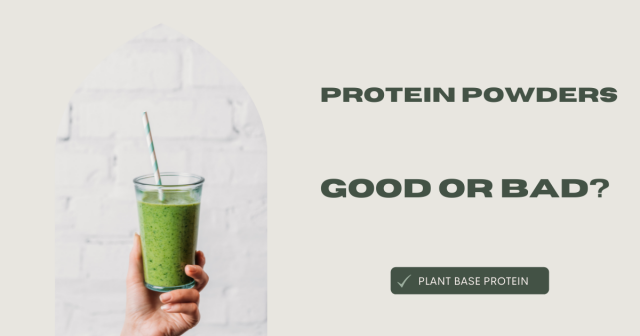
some protein powders have little added sugar, and others have a lot (as much as 23 grams per scoop)
Some protein powders turn into a drink with more than 1200 calories leading to weight gain and an unhealthy spike in blood sugar.
However, natural plant base protein shakes are generally a good alternative if you are unable to fuel up with real food after a workout.
Remember, protein powder is a dietary supplement and should only be used when you have no access to real food.
Safe protein shakes that I use are found in my recipes blog notes section.

